|
|
|
Sort Order |
|
|
|
Items / Page
|
|
|
|
|
|
|
| Srl | Item |
| 1 |
ID:
132419
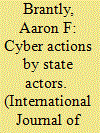

|
|
|
|
|
| Publication |
2014.
|
| Summary/Abstract |
Covert action is as old as political man. The subversive manipulation of others is nothing new. It has been written about since Sun Tzu and Kautilya. People and nations have always sought the use of shadowy means to influence situations and events. Covert action is and has been a staple of the state system. A dark and nefarious tool often banished to philosophical and intellectual exile, covert action is in truth an oft-used method of achieving utility that is frequently overlooked by academics. Modern scholars contend that, for utility to be achieved, activities such as war and diplomacy must be conducted transparently. Examined here is the construction of utility for a subset of covert action: cyber attacks.
|
|
|
|
|
|
|
|
|
|
|
|
|
|
|
|
| 2 |
ID:
131760
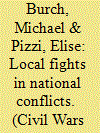

|
|
|
|
|
| Publication |
2014.
|
| Summary/Abstract |
How do rebel groups determine their targets during intrastate conflict? We build upon two competing theories in conflict studies that emphasize either the social or economic determinants of violence during war and use geographic information systems (GIS) analysis to explore these competing theories. To do this, we utilize a subnational analysis of the most likely case of the Democratic Republic of the Congo to understand whether ethnicity or natural resources motivates the location of conflict events. Accounting for geography, we find that economic endowments in the form of natural resources are highly related with the number of violent attacks, while the presence of competing ethnic groups does not offer much help in understanding the location of conflict events.
|
|
|
|
|
|
|
|
|
|
|
|
|
|
|
|
| 3 |
ID:
132369
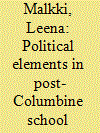

|
|
|
|
|
| Publication |
2014.
|
| Summary/Abstract |
School shootings have traditionally been interpreted as non-political acts. Empirical evidence, however, suggests that not all shootings are necessarily so different from political violence, at least in the shooter's own opinion. The article analyses 28 school rampage shootings in Europe, the U.S., and Canada from 1999-2011 to determine common and prevalent political elements in the shootings. The shootings are divided into three categories: shootings with overtly political communication (four cases), shootings with references to previous school rampage shootings (13 cases), and isolated incidents (11 cases). While it is possible to question whether the shootings were genuinely politically motivated, it is clear that the majority of school shooters link their deed to the agenda and beliefs presented by the Columbine shooters, which has created a sense of tradition, continuity, and imagined community among the shooters and their admirers, not unlike in cases of terrorism and political violence that are referred to as leaderless resistance.
|
|
|
|
|
|
|
|
|
|
|
|
|
|
|
|
| 4 |
ID:
133580
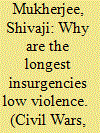

|
|
|
|
|
| Publication |
2014.
|
| Summary/Abstract |
There is a puzzle yet unanswered by theorists of civil war - why are the longest insurgencies low levels of violence? I argue that medium capacity states with multiple insurgencies tend to choose a counter insurgency strategy of containment vis-à-vis peripheral sons of the soil insurgencies, causing them to become stalemated low scale conflicts. While the current literature focuses on commitment problems, or low state capacity to explain such persistent low intensity insurgencies, my theory suggests that central politicians of these medium capacity states try to follow a policy of containment, particularly vis-à-vis the peripheral ethnic 'sons of the soil' insurgencies which are of low priority in terms of threat to political survival of these central politicians. The theory is tested on the Fearon (2004) data-set, and shows that those medium capacity states with multiple conflicts and sons of the soil insurgencies tend to have these low intensity long lasting insurgencies. This paper contributes to the literature on civil war duration, and also to the literature on sons of the soil conflicts. It investigates the different conditions under which state elites do not have sufficient incentives to try and eliminate rebels, because it is unacceptably costly to do so.
|
|
|
|
|
|
|
|
|
|
|
|
|
|
|
|
| 5 |
ID:
125313
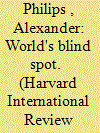

|
|
|
|
|
| Publication |
2013.
|
| Summary/Abstract |
Children starve. Young girls sell their bodies to eat. There is no clean drinking water. There are no doctors. Refugees are not allowed to leave the camps. As the rainy season approaches, waterborne diseases will spread like wildfire. This is the plight of the over 200,000 Rohingya who survive in makeshift refugee camps along the Myanmar's border with Bangladesh. Although their situation is dire, they are better off than the Rohingya being slaughtered back in Myanmar. According to the United Nations, the Rohingya are the world's most ignored and persecuted minority. They have faced decades of neglect and dehumanization while the world stands by; it is time for the response of the international community to change. The situation in Myanmar has reached a tipping point and the country is a tinderbox, ready to ignite into violence. The inaction of the international community has allowed the persecution of the Rohingya Muslim minority to escalate into state-sponsored ethnic cleansing and a spreading humanitarian crisis in Myanmar's western Rakhine state
|
|
|
|
|
|
|
|
|
|
|
|
|
|
|
|
|
|
|
|
|